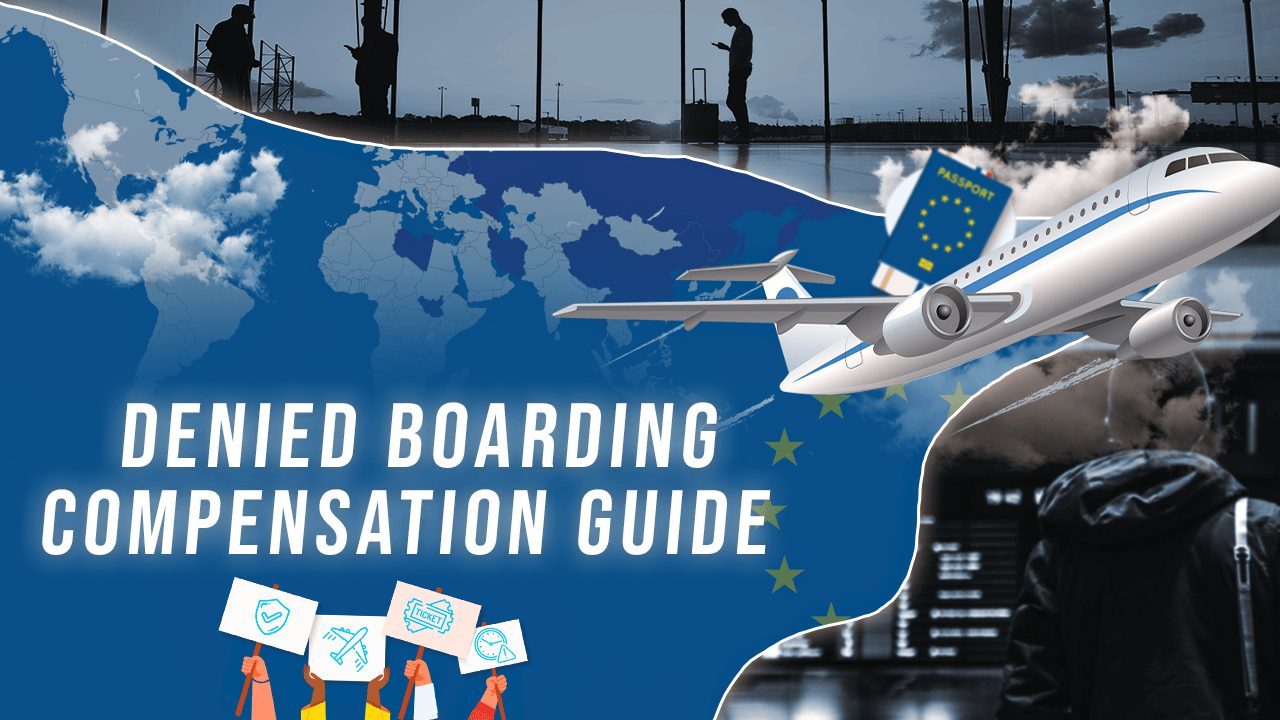Occasionally, airlines may prevent you from boarding the plane – a situation referred to as being ‘denied boarding’. When such a circumstance arises through no fault of your own, you might be eligible for compensation. The amount you receive can depend on various factors, including your destination and the duration of the delay. If the airline is at fault, you have certain rights that can protect you. In this guide, we will provide comprehensive insights about denied boarding compensation, helping you navigate this challenging scenario, assert your rights, and ensure you are properly compensated for your inconvenience. Information in this article was updated in 2025.
Key Takeaways
- Passengers can be entitled to compensation if denied boarding due to situations beyond their control such as airline overbooking, provided that they hold confirmed reservations. The eligibility, however, does not extend to instances when the passengers are at fault, such as arriving late or posing a safety risk.
- Compensation rules and amounts differ based on geographic location. EU flights fall under EC 261 regulations where passengers may claim up to €600. US laws specify compensation for overbooking, but amounts can vary per airline. For international flights, regulations such as the Montreal Convention may apply.
- If denied boarding, passengers should refrain from volunteering their seat, ask the reason for being bumped and get it in writing, request an alternate flight or a refund, claim immediate compensation, and retain all relevant documentation for possible future claims.
- Claims can be filed directly with the airline or through a specialized company. Filing personally requires gathering all documentation and completing the relevant claim forms, while specialized companies take care of the process, usually accepting only cases they are confident of winning.
- Besides the immediate compensation for denied boarding, passengers may also be eligible to file for damages incurred due to the boarding denial under specific regulations like the Montreal Convention. Specialist help might be beneficial in navigating this relatively gray area of flight compensation law.
What to Do If You’re Denied Boarding?
You have a valid registration if you purchased your seat and received confirmation. Unfortunately, sometimes airlines sell more seats than they have on the plane in hopes that people will cancel or not show up. If this doesn’t happen, then they are forced to deny boarding. Being bumped due to overbooking is a headache, but you’re protected under EC 261 and other regulations, depending on where you’re flying.
Here’s everything you need to know about what to do next if you’re denied boarding. You will get to your final destination and may claim up to €600 for your troubles.
EU Flights
If you are denied boarding while flying in the EU or certain EU airspace, then you are covered under EC 261. You can file a claim for additional compensation as long as you meet the approved criteria. Though overbooking is less common in Europe, it does happen, so it’s important to be equipped with the right information on what to do next. The below outline your rights.
- Don’t volunteer to give up your seat. Before the airline starts bumping people, they will offer perks to passengers to voluntarily give up their reservations. As they get more desperate, the benefits may be tempting, and if they total more than €600, you may want to consider taking it if it works in your favor. Just know that you waive your rights to claim future compensation on this flight if you do.
- If no one volunteers to give up their seat and you’re unlucky enough to be denied boarding, ask why you’re getting bumped. Get their reasoning in writing. While overbooking is the most common reason, there are others that may happen, so make sure to get official documentation from their airline.
- Request an alternate flight to your final destination. The airline must provide you with the next fastest route, even if it’s not offered through them. If you prefer, you can request a refund and a plane ticket to your point of origin if you’re not at home.
- Request compensation immediately. Under EC 261, airlines must pay you before you leave the airport. This compensation is in addition to the new flight or refund. If applicable, they should also provide meals and refreshments if you’re being delayed over meal times. Additionally, if your flight is delayed overnight, they should also provide you with hotel accommodation, transport, and any personal items that you may need as a result of being denied booking.
- Keep all your documentation, including boarding passes, receipts, and other information that can help make your case. If the airport doesn’t fully compensate you, you can file a claim later.
To be eligible for denied boarding compensation, the airline must be at fault. For example, if you’re late, that does not count. Additionally, if you have posed a safety or security concern, you can also be denied boarding. These expenses will be your responsibility. EC 261 only covers those that the airlines are responsible for, the most common of which is overbooking.
US Flights
US passenger law isn’t as advanced as EC 261, but denied boarding due to overbooking is one area they have clearly defined rights. You are eligible for compensation if the airline is at fault. You did not ask to be overbooked, and they are required to pay you out an overbooked flight compensation. Here’s what you need to do next to ensure you have what you need to file a claim.
- Don’t volunteer your seat. Much like in Europe, if you volunteer to give up your seat, then you are giving up your rights to file for future compensation. Again, consider what they are offering you. Some airlines have written into their terms that they will only offer you a certain amount of money, so be aware of the limits. If an airline is desperate enough, it may choose to override its own bylaws in the hopes of getting someone to volunteer.
- Ask why you’re being denied boarding. In the US, you are only eligible for compensation if you are being denied boarding for overbooking. If you can, get this reason in writing. It will help you later if you need to file a claim.
- Work with the airline on a new flight. They are required to get you on the next available flight to your final destination, even if it’s not with them. If you don’t want an alternate flight and would rather just get a refund, you can do that too. They’ll refund you for the unused portion of your ticket and send you back home if needed. You have options, even if it doesn’t feel like it when you’re denied boarding.
- Request additional compensation. As long as you didn’t accept anything from them already and voluntarily waive your rights, you are eligible for additional compensation, the amount of which will likely be specified in their terms and conditions. Make sure you’re aware of the maximum before you ask, so they don’t try to lowball you. They should pay you out at the airport in cash, travel vouchers, or more.
- Keep all your documentation, including your boarding pass, travel documents, receipts, and anything else that shows you were denied boarding due to overbooking and faced extra costs. You can always file a claim later once you’re thinking more clearly.
Denied boarding due to overbooking is covered under US travel laws, so don’t be afraid to ask for what you deserve.
International Flights
You may be eligible for denied boarding compensation when traveling internationally, depending on where you’re traveling. EU 261 covers most of Europe, but there are other regulations that cover international travel, like the Montreal Convention. Thankfully, many of the same steps still apply. Research where you’re traveling to understand what protections are in place and contact customer service. Some will offer compensation as a goodwill gesture.
- Don’t volunteer to give up your seat unless you want to waive your rights for future compensation.
- Ask why you’re being denied boarding and get the reasoning in writing if you can. You’ll need this later to file a claim, so get the airline to claim responsibility immediately.
- Request an alternate flight, refund, or trip home. You have options, and as you negotiate with the airline, be polite but firm. You paid for your ticket, and you have a right to get wherever you need to be.
- Keep all your receipts, travel documentation, boarding passes, and more. Think about anything that will help you prove your case. If you incurred additional expenses, you might be able to file for compensation and/or damages, depending on the law.
Laws vary from country to country, so make sure to research before you leave.
Has your flight been disrupted?
Don’t let flight disruption issues cost you – get compensated up to €600!
What Denied Boarding Compensation Can I Get?
The compensation you can get really depends on where you’re traveling. If you are denied boarding in the EU, you can get up to €600, depending on the circumstances. Remember, the denied boarding has to be within the airline’s control in order to qualify. If not, then the fault is yours. That includes if you’re late, disruptive, don’t have proper documentation, and more.
In the US, the amount you can claim varies per airline. There are no set standards in place like there are in other countries. The only firm stipulation in place is that it has to be denied boarding due to overbooking to qualify. Under the Montreal Convention, you can file for damages that the denied boarding claimed. Because this is a gray area in flight compensation law, it may be easiest to partner with a specialist to help you get the money you deserve.
How to Claim Compensation for Denied Boarding?
Denied boarding compensation is necessary if you weren’t allowed to board your plan at no fault of your own. Depending on where you’re flying, you have to meet different criteria, so you need to understand what you’re filing for. You can file a claim yourself through the airline or work with a specialized company to settle your claim. You can find the best disrupted flight compensation companies bellow.
There are pros and cons to both, and here’s what you can expect.
To file yourself, you need to gather all your documentation, fill out EC261 claim form and send it to your airline. You can get this directly by filling out this EC261 claim form or after by contacting customer service. Once they have everything, they will review the claim to determine your eligibility. Airlines may deny your claim, so be prepared to file an appeal and submit additional documentation as requested. This process can be lengthy, and your odds of winning vary.
To file with a company, you submit your case to them directly. They will review everything to see if they think you will win. Typically, these companies only take cases they know they can win. This is because they only get a fee if you win, so it’s in their best interest to only take slam-dunk cases! If the company needs to take your case to court, you may face additional fees. You often get your winnings faster when you work directly with a lawyer, but you don’t get your full winnings to pay their fees.
Either way, the most important thing you can do is file a claim. You’ll never get denied boarding compensation if you don’t.
Video Version
Conclusion
If you were denied boarding, you are eligible for compensation under many laws – as long as it was in the airline’s control. Most often, this will happen because of overbooking, which isn’t fair to you. Work with the customer service teams on site to get your new flight and your compensation. If not, you can always file a claim.
FAQ
-
What is denied boarding compensation?
Denied boarding compensation is a right for passengers who have been denied to board a flight they had a confirmed reservation for, due to reasons beyond their control, most commonly overbooking by the airline. The compensation serves to protect passengers and hold airlines accountable for their booking practices.
-
How much is denied boarding compensation?
The amount of denied boarding compensation varies depending on the geographical jurisdiction. For example, under the EU’s EC 261 regulations, passengers may be entitled to up to €600. In the US, the compensation amount varies by airline and is typically specified in the airline’s terms and conditions.
-
How to claim compensation for denied boarding?
To claim compensation, you need to fill out a claim form (like the EC261 claim form for EU flights) and provide all the necessary documentation. This includes your boarding pass, travel documents, receipts, and any other evidence that proves you were denied boarding. You can either file this claim yourself directly to the airline or hire a specialized company to handle the claim on your behalf.
-
How long do I have to claim compensation for denied boarding?
The time limit to claim compensation can vary depending on the country. For example, under EC 261 regulations in the EU, passengers can claim compensation for up to three years after the flight date. In the US, the time limit can vary depending on the specific airline’s policy. It’s best to file a claim as soon as possible after the incident.
-
What documentation do I need to claim denied boarding compensation?
You need to provide as much documentation as possible that can support your claim. This includes your boarding pass, travel documents, receipts of any additional expenses incurred due to being denied boarding, and any communication or official documentation from the airline explaining why you were denied boarding.
-
Does denied boarding compensation apply only for EU flights?
No, denied boarding compensation is not exclusive to EU flights. While the EU’s EC 261 regulation is one of the most comprehensive, other countries also have laws regarding compensation for denied boarding due to overbooking. For example, in the US, airlines must provide compensation to passengers who were denied boarding against their will. For international flights, regulations such as the Montreal Convention may apply.
-
What to do if you have been denied boarding?
If you have been denied boarding, you should ask for the reason in writing, request an alternate flight or a refund, claim immediate compensation at the airport, and retain all relevant documentation. Refrain from volunteering your seat as this may waive your rights to compensation. If the airline doesn’t fully compensate you at the airport, you can file a claim later.





